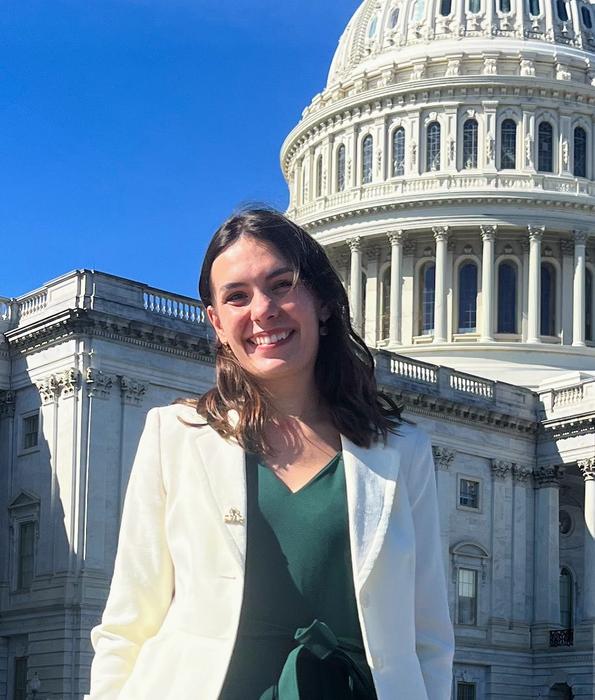The American Institute of Biological Sciences (AIBS) is pleased to announce that Alex Rich and Efraín Rodríguez-Ocasio have been selected to receive the 2024 AIBS Emerging Public Policy Leadership Award (EPPLA). The award recognizes graduate students in the biological sciences who have demonstrated leadership skills and an aptitude for working at the intersection of science and public policy.

Credit: Amy Huynh
The American Institute of Biological Sciences (AIBS) is pleased to announce that Alex Rich and Efraín Rodríguez-Ocasio have been selected to receive the 2024 AIBS Emerging Public Policy Leadership Award (EPPLA). The award recognizes graduate students in the biological sciences who have demonstrated leadership skills and an aptitude for working at the intersection of science and public policy.
Alex Rich is a Ph.D. student in neuroscience at Yale University in New Haven, Connecticut. Her research focuses on decision-making and disordered eating. Specifically, she seeks to understand the neural basis of food choices to inform binge eating disorder treatments. At Yale, Rich co-chairs the Advocacy Committee in the Graduate and Professional Student Senate, where she serves as a liaison between graduate students and university administration to advocate for policy change. Furthermore, Rich is also engaged in national science education policy issues as Secretary of the Graduate Research and Development (GRAD) Coalition, the student arm of the GRAD Caucus in the US House of Representatives. In this role, she helped organize a congressional briefing on graduate student mentorship. Rich earned her bachelor’s in neuroscience from the University of Minnesota (UMN), where she also helped compile neuroscience research to support trauma-informed campus policy development as a member of the UMN Provost’s Council on Student Mental Health.
Efraín Rodríguez-Ocasio is a Ph.D. Candidate in chemical and biological engineering at the Iowa State University (ISU) in Ames, Iowa. His doctoral research focuses on microbial utilization of plastic waste that has been subjected to thermal oxo-degradation. At ISU, Rodríguez-Ocasio served as engagement officer for the Graduate and Professional Student Senate, where he coordinated advocacy efforts for graduate student interests at the state and federal level. He is an active member of several committees for the Society for Industrial Microbiology and Biotechnology (SIMB), including the Policy and Advocacy; Membership; and Diversity, Equity, and Inclusion (DEI) committees. At SIMB, he also serves on the Connecting Microbiome Communities (CMiC) Steering Committee and will chair the Microbiome Policy, Advocacy and Regulation session at the inaugural meeting this year. Rodríguez-Ocasio received his bachelor’s in industrial biotechnology from the University of Puerto Rico at Mayagüez, where he also served as a trustee and member of the governing board.
Rich applied for the EPPLA because she is passionate about supporting future biologists’ academic and scientific endeavors through federal advocacy. “What I find most fulfilling is translating newfound understandings of the world into a framework for tangible change,” she said. Rodríguez-Ocasio pursued the award for the opportunity to advocate for science, gain new skills, and build a professional network in the science policy community. “I am passionate about science in the service of society, and this award offers a bridge to opportunities where I can use my background to help shape the scientific response to national and global problems,” he said.
Both the awardees think it is critical for scientists to engage in policy. “When scientists communicate their research and that of their peers beyond the lab, the impacts of biological research become woven into the fabric of society in a way that addresses pressing issues and permeates everyday life,” argues Rich. Rodríguez-Ocasio believes that “it is vital to keep policymakers informed of the value created by the science they funded and remind them that scientific discovery is in the national interest because few things have pushed this country forward as science has.”
This is the 21st year the EPPLA program has recognized emerging student leaders in science policy. “We are proud to recognize graduate students from across the country who have demonstrated tremendous leadership potential in science advocacy,” said Scott Glisson, AIBS Chief Executive Officer. “Alex and Efraín join an accomplished group of EPPLA awardees who are playing an important role in bridging the gap between science and policy.”
Rich and Rodríguez-Ocasio will travel to Washington, DC, in April to participate in an AIBS science communications training program and to meet with their members of Congress as part of the annual AIBS Congressional Visits Day. In addition, they will receive a one-year subscription to the scientific journal BioScience.
AIBS is also recognizing two additional outstanding leaders with an Honorable Mention award. Hannah Henry is a master’s student in natural resources at Auburn University in Auburn, Alabama. Harrison Watson is a Ph.D. student in ecology and evolutionary biology at Princeton University in Princeton, New Jersey. Henry and Watson will receive a one-year subscription to BioScience.
AIBS is the national organization dedicated to promoting informed decision-making that advances the biological sciences for the benefit of science and society. The EPPLA program is one way that AIBS builds the capacity of the scientific community to promote sound decision-making.
The EPPLA program is made possible by the generous financial support of AIBS donors. More information about the EPPLA program and AIBS is available at https://www.aibs.org/.
-END-




